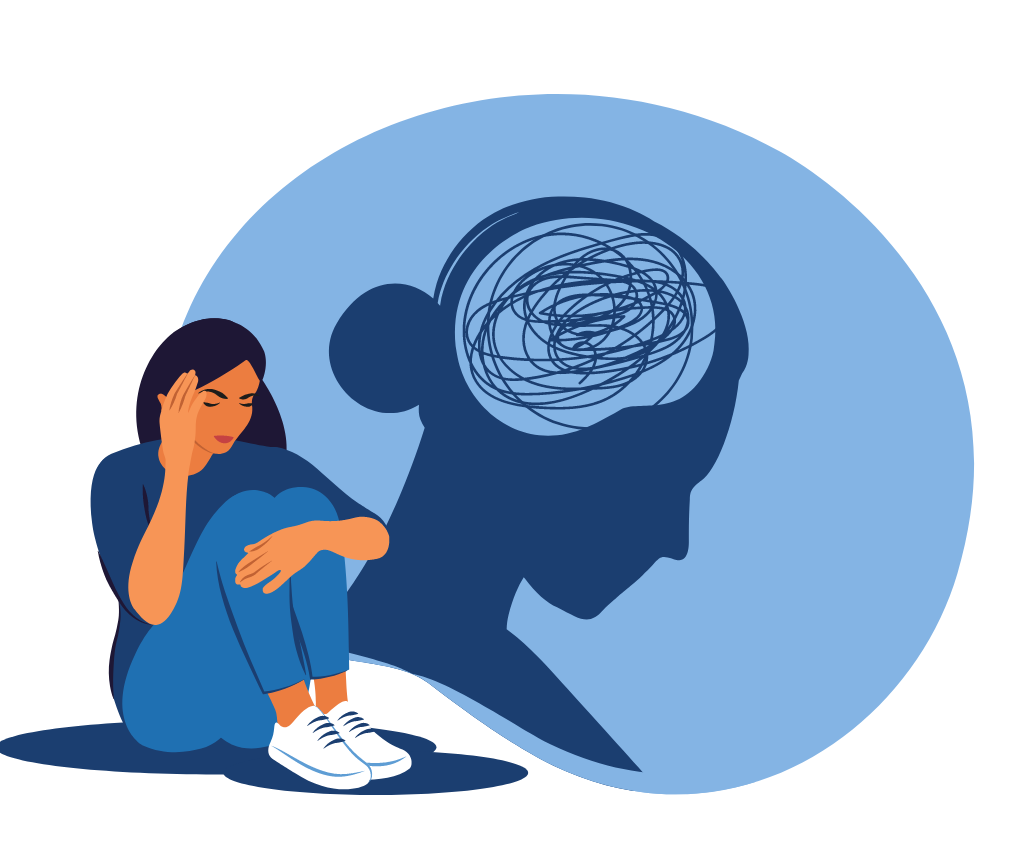Depression is a common but serious medical illness that negatively affects how you feel, think, and act.
It is not the same as being unhappy or in a blue mood. It is not a sign of personal weakness or a condition that can be willed or wished away.
People with depression cannot take control of their feelings and behave calmly. It can lead to thoughts of taking their life.
Depression can affect anyone, but it’s more common in women than in men, and it is also one of the most treatable psychiatric conditions. With appropriate treatment and support, most people with depression improve significantly, although they may need to try different treatments before finding one that works for them.
The earlier the diagnosis and treatment, the better the prognosis (outlook).
Signs and symptoms
The signs and symptoms of depression aren’t always as apparent as you might think.
It’s important to remember that everyone feels sad or “down” sometimes. And if you’ve ever been through a rough patch in life or had your heart broken by a loved one, you may have experienced what some people call the “blues.” But the blues don’t last long and don’t interfere with daily functioning.
The following are some common signs and symptoms
- Continuous low mood or sadness
- Feeling hopeless and helpless
- Having low self-esteem
- Feeling tearful
- Feeling guilty
- Feeling irritable and intolerant of others
- Loss of interest in activities that used to be pleasurable
- Not getting any enjoyment out of life
- Feeling anxious or worried
- Having suicidal thoughts or thoughts of harming yourself
- Changes in appetite resulting in weight gain or weight loss
- Sleep disturbances — either sleeping too much (hypersomnia) or having difficulty sleeping (insomnia) most nights
- Lack of energy, fatigue and slowed movements and thoughts (psychomotor retardation)
- Difficulty concentrating, remembering details and making decisions
What causes depression
Some researchers think that depression alters the way neurotransmitters work in your brain in ways that cause depression symptoms. Although it’s unclear exactly how these changes occur or why they happen in people with the disease compared to those who don’t have the disorder, research suggests that several possible factors are involved.
So, major depression is a multifactorial disease with several causes and triggers, such as genetic susceptibility, stress, and inflammation.
The brain produces chemical messengers called neurotransmitters, such as serotonin, norepinephrine and dopamine. In depression, there may be reduced levels or alterations in how these brain chemicals work.
What changes occur in the brain
When you have the disease, the brain has chemical and physical (anatomical) changes.
Research has shown a reduction of grey matter volume in major depression. This is because the grey matter contains the neurons. Therefore, the loss of grey matter is responsible for cognitive capabilities.
When the condition is severe, there is a more significant loss of grey matter volume. Three major changes happen to a depressed person’s brain.
- Shrinking of the hippocampus, thalamus, frontal cortex, and prefrontal cortex can happen in depression.
- Experts also claim brain inflammation and depression are closely linked. Brain inflammation is connected to the death of neurones. Therefore, people who suffer from depression for a long time have brain shrinkage and associated impaired cognitive functions.
- Depression-induced breathing patterns can reduce brain oxygenation, leading to inflammation and subsequent brain shrinkage.
Types of depression
There are many types, and the most common forms are,
- Major depression. This is the most common type and involves periods of sadness and lack of interest lasting at least two weeks, plus four or more additional symptoms, such as changes in sleep and appetite.
- Persistent depressive disorder (dysthymia). This milder form of depression lasts at least two years but doesn’t have the same intensity as major depression.
- Bipolar disorder (manic-depressive illness). People with bipolar disorder have periods of extreme highs (mania) and extreme lows (depression).
Diagnosis of depression
Treatment for depression involves medications, psychotherapy or both.
While medication is often used with psychotherapy, psychotherapy can help you manage your depression symptoms, such as thoughts, feelings and behaviours.
Psychotherapy is a talk therapy that can help you understand your thoughts and feelings and how they affect your life.
In counselling or psychotherapy:
- You usually talk about what’s bothering you for an hour or two each week with a mental health professional.
- With the therapist’s guidance, you may learn new ways of thinking about problems or find better ways to cope with stress.
- The goal is to reach a healthy state of mind where it feels like life has meaning again.
Anti-depression medication categories are,
- Selective serotonin reuptake inhibitors (SSRIs).
- Serotonin and noradrenaline reuptake inhibitors (SNRIs).
- Tricyclic antidepressants (TCAs).
- Monoamine oxidase inhibitors (MAOIs).
- Norepinephrine and dopamine reuptake inhibitors (NDRIs).
- Non-competitive N-methyl-D-aspartate receptor antagonists.
The Bottom Line
It is a mode disorder affecting millions of people globally. Everyone could have suffered from the disease at one point in life.
People who suffer from the disease feel a lack of life purpose and, in the end, can lead to suicide.
Imbalances in dopamine and other neurotransmitters are responsible for the disease.
Both psychotherapy and medications are used to treat it.



